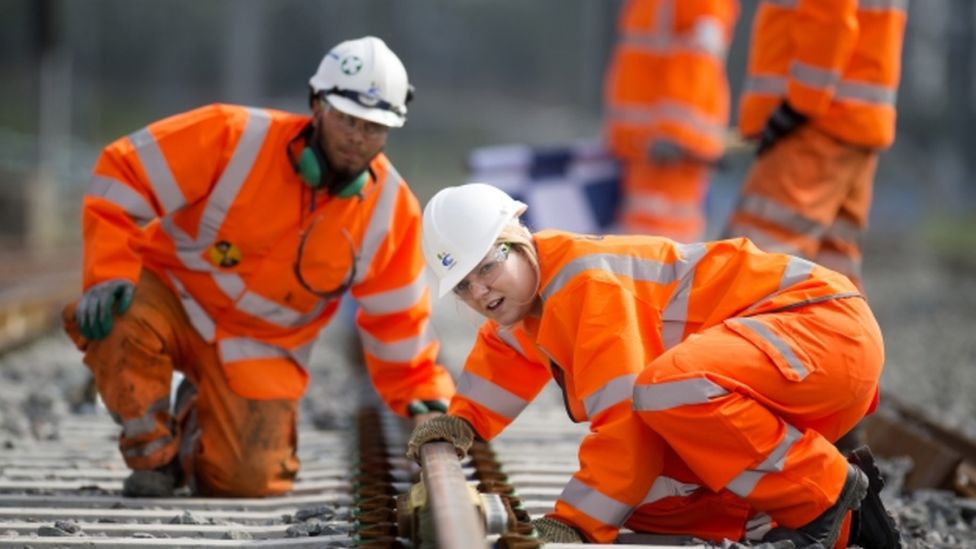Key UK contractor Carillion denies rescue plan in doubt
- Published
- comments

Troubled construction firm Carillion has denied reports lenders rejected a proposed rescue plan for the business.
The firm, which is a key government contractor for projects including schools and prisons, said crunch talks with stakeholders were still ongoing.
The firm is struggling under £1.5bn of debt, including a pension shortfall of £587m, raising fears about its future.
Ministers are drawing up plans to take over prisons contracts worth £200m from Carillion, the BBC understands.
Reports that creditors had turned down a potential rescue plan sent the firm's shares down by more than 28% on Friday.
Administrator firms PwC and EY were also reported to have been put on standby as talks about the firm's future carry on.
'Constructive talks'
In a statement, Carillion said: "Suggestions that Carillion's business plan has been rejected by stakeholders are incorrect."
It said the firm remained in constructive dialogue about short term financing while "longer term discussions are continuing".
Carillion also said turnaround proposals on the table were likely to cost shareholders.
The government, the Pensions Regulator and representatives from the firm held crunch talks to discuss the firm's options on Friday.
What does Carillion do?
The company is the UK's second-largest construction company and a key government contractor. It employs 43,000 people globally.
But it is perhaps best known for being one the largest suppliers of services to the public sector.
Notably, it holds a contract to build part of the forthcoming HS2 high speed railway line and is the second largest supplier of maintenance services to Network Rail.
It also maintains 50,000 homes for the Ministry of Defence, manages nearly 900 schools and manages highways and prisons.
A government spokeswoman said it has been monitoring the situation to ensure its "contingency plans are robust".
The general secretary of the RMT rail union, Mick Cash, said Carillion's workers were "not responsible for the crisis".
He added that workers "should have protection and guarantees from the government, including an assurance that operations will be directly transferred over to Network Rail with all jobs, pensions and rights safeguarded if Carillion goes bust".
In addition to its rail operations, Carillion also manages nearly 900 schools, provides services to the NHS and works with National Grid.
The assistant general secretary of the Unite union, Gail Cartmail, said: "The government must consider all options while the future of Carillion hangs in the balance, including bringing contracts back in-house."
The company held talks with its lenders and advisers in London on Wednesday.
However, no announcement has been made on a business plan to secure its future.
'Major supplier'
The government confirmed ministers met yesterday to discuss Carillion's future and were "monitoring the situation closely".
The Financial Times reported that David Lidington, who was moved to the Cabinet Office as part of Prime Minister Theresa May's reshuffle this week, convened the meeting with Business Secretary Greg Clark, new Justice Minister Rory Stewart, new Transport Minister Jo Johnson and Liz Truss, Chief Secretary to the Treasury.
A government spokeswoman said: "Carillion is a major supplier to the government with a number of long-term contracts. We are committed to maintaining a healthy supplier market and work closely with our key suppliers."
Carillion was forced to ask its banks, which include Santander UK, HSBC and Barclays, for support after breaching its loan agreements last year when it issued a series of profit warnings.
The firm's share price has plunged by more than 90% over the past year.
The company has been working on a plan which it said "will provide the basis for the agreement of a proposal to restore Carillion's balance sheet".
A spokeswoman for the Pension Protection Fund said it was "aware of the discussions between the company, government and banks and, along with the trustees and the Pensions Regulator, will act as it always does to protect the interests of Carillion scheme members and levy payers".
A spokesman for the Pension Regulator said: "We have been and remain closely involved in discussions with Carillion and the trustees of the pension schemes as this situation has unfolded. We will not comment further unless it becomes appropriate to do so."
- Published12 January 2018
- Published7 January 2018
- Published15 January 2018